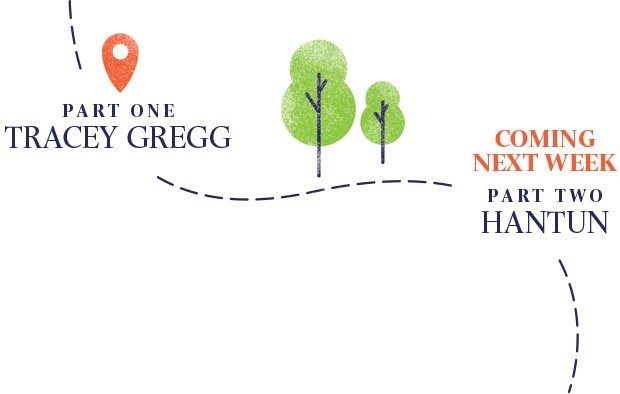Sunny Avenue, Wavell Heights, Brisbane: one street, six lives, countless stories
One suburban street. Six people chosen at random. What will their stories say about Australia going into the 2020s?
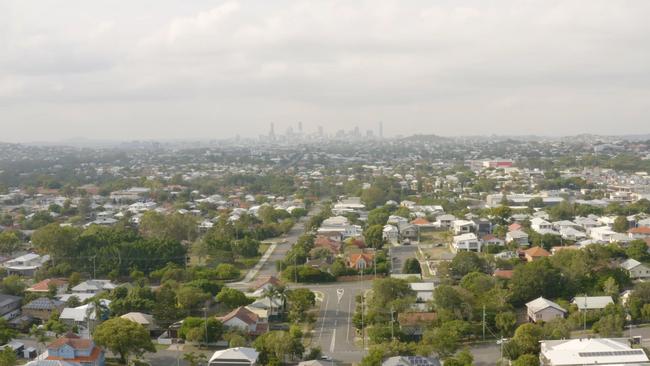
Some days it rains on Sunny Avenue. Some days a summer storm whirls over the heights of Wavell Heights, north Brisbane, and smashes so violently against Hantun Hantun’s kitchen window that the Burmese concreter is reminded of the typhoons that nearly dragged him to the bottom of the South China Sea. Across the street from Hantun’s house a dog named Frankie barks nervously inside a brick and stucco Tudor-style home and Tracey Gregg reminds her loyal mini dachshund that the storm will pass like they always do.
Six letterboxes along from Tracey’s house, landscape gardener Tom Moore stubs a cigarette out under his thong and wonders why he bothered washing his Holden yesterday. Then the clouds break and the crows return to their telephone poles and the street shines bright and lives up to its giddy name. That’s when the Scott sisters, Leila and Polly, do cartwheels in the yard two doors down from Tracey, and their mum Hannah wonders how on earth a woman from northern England will ever survive this humidity, this airless swelter that makes the bitumen melt and the airconditioning clap out and the plants curl up and die.
In the last even-numbered house in the street, a hairdresser who turned herself into a psychologist, Robyn Clauscen, stays inside where it’s cool and adds the finishing touches to a picture she’s painting from a portrait of Margaret Olley. And you better believe there is art in all this ordinary life. There is meaning in it. Bloody well has to be, or what the hell are we all doing here?
No art was ever found in a road; our roads were built for transportation. But our streets were built for stories. For oils and acrylics. For colour. Black bin. Green bin. Yellow bin. Red-headed Australian King Parrot. Red leather cricket ball. Red blood on a broken skateboard. Fluorescent orange frisbee. Purple and pink togs and a sky-blue water slide. Silver Toyota Kluger. Emerald green Commodore. Chrome BMX. Mauve semi-formal dress. Brown work boots. White wedding dress. Blue and yellow blanket for a newborn baby boy. And a black hearse moving slowly, carrying the sweetest grandad who ever lived out of Sunny Avenue, taking a right on Spence Road toward his next life.
The stories of Sunny Avenue. Gary Diggles has heard every one of them. He slides open his front window, leans out and breathes deep. His heart broke down on him a decade ago but something is keeping him alive, and it might just be this street where he’s lived for almost half a century. Gary’s watched this street grow in exact accordance to the growth of modern Australia. He’s watched pre-war cottages turn into apartment blocks. He’s watched Malvern Stars turn into iPads, flared pants turn into skinny black jeans and turn right back again. He knows the hard demographics of his neighbourhood. Median age 37. Median weekly household income $2041. There are 1.8 vehicles per dwelling, and that missing 0.2 of each second car is represented by the bonnet missing from that Nissan parked in front of the party-house rental across the road. Median monthly mortgage repayments $2200. Some 49.2 per cent of residents married. Some 86 per cent English-speaking.
But Gary knows a street is so much more than its numbers. He nods and smiles at his neighbours; he talks with them while he waters his plants. Some people can spend half a century nodding and smiling at a neighbour and never take the time to ask for their last name, much less their preferred stuffing in a roast chook. “You wouldn’t believe the stories your neighbours will tell you when you take the time to listen,” Gary says.
For the next six weeks in this magazine we’ll get to know the neighbours of Sunny Avenue. Six randomly chosen people from a street chosen for nothing more than the promise of its name. Six houses. Six perfectly ordinary and perfectly miraculous stories that will help tell one story of an Australian street. Because there is meaning in all this ordinary life. There is something beautiful here. There is colour. There is art. There is a story.
Welcome to Sunny Avenue.
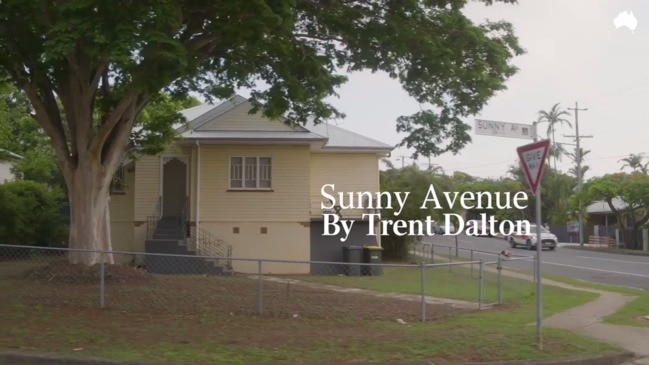
The Street: Tracey Gregg
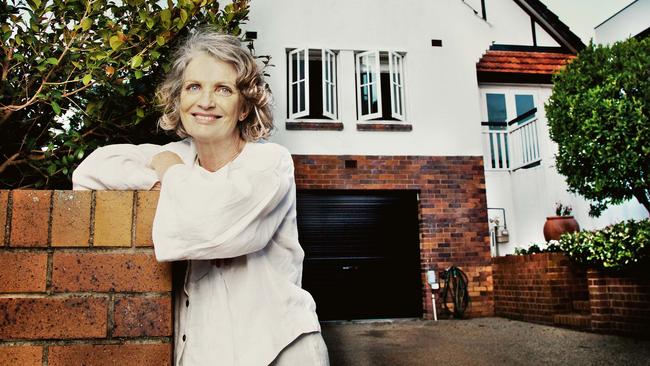
She tells herself it’s just a garage door. A plain old square piece of metal as wide as a car with a handle in the middle that she’s gripped for the past 25 years to raise the dumb, dented roller door up and down. But to say that garage door is just another garage door is to say that Tracey Gregg is just another mum standing on just another driveway of just another house on Sunny Avenue. The man standing next to her is going to replace her garage door. He is talking about the latest finishes and colours and the merits of remote-controlled doors that better suit the busy lives of 57-year-old retiree mums who play mahjong every Thursday and volunteer at the FareShare charity kitchen every Monday and buy the groceries and walk Frankie the dog and drive to the library every day in between. But Tracey’s not listening to the garage door man; she’s thinking about all the games of driveway cricket her three sons played here. Wickets made out of tape and chalk and rock dust traced on the black roller door. Her youngest boy, Fraser, at the crease. Elliot fielding in silly mid-off. Shirtless and sun-bronzed Alex, her eldest, with a red leather ball in his hand making his long and lethal run-up from across the street. Bang! Alex’s short-pitched opening ball makes a dent in the door. Bang! Fraser ducks a full-toss headhunter and another dent forms. Tracey sees herself in this memory. She’s in her early 40s, leaning out the front window and telling Alex to turn the volume down on the chin music. The neighbours’ kids emerge from their yards, drawn to her house like sea-lost sailors by the sound of that ball smashing into metal. The sound is maddening but it is music, too. It is the song of Sunny Avenue and it will play all summer long. Bang! But then Fraser has a win; he straight-drives the ball with flight and it soars for surely half a kilometre south across the Brisbane suburbs toward the CBD. That leather ball has wings.
Standing on the driveway in present day Sunny Avenue, Wavell Heights, Tracey begins to weep. It’s just a bloody garage door, she tells herself, and she turns her head to hide her tears.
“Everything all right?” asks the garage door man.
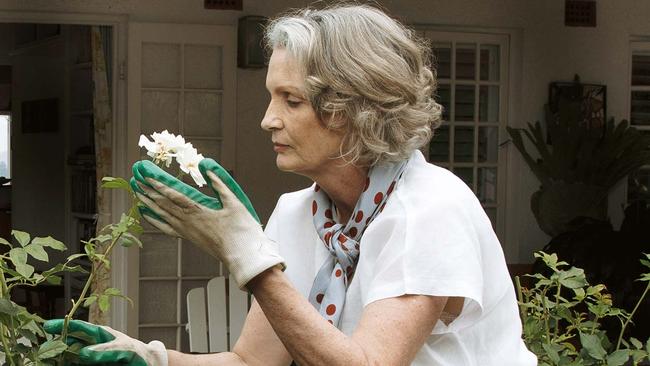
When Tracey Gregg was very young her father, Grahame Gaudion, always filled up the family’s Ford Falcon station wagon at a service station on Spence Road, which runs past the eastern end of Sunny Avenue. “Can we drive home past The Castle, Dad?” Tracey always asked from the back seat. She called it The Castle because it reminded her of something from a fairytale. A place where princesses lived. This house wasn’t like the timber Queenslanders on stumps where she grew up in neighbouring Virginia. It had dark brown brick on the bottom and cream stucco on top. A towering, sharp-angled shingled roof. A brick chimney stack. It looked like a house that belonged in snow or a dark forest in Eastern Europe. It belonged in her dreams.
Tracey’s father was a fitter and turner. He ran a modest mechanical engineering garage out of the family home. Her mother, Helen, worked for 50 years in the same job at a supermarket. Tracey’s parents rarely had spare money to take their four children to fairgrounds or picture theatres or trips to the coast but Grahame knew that a slow drive past The Castle would fill Tracey with joy. She would turn to her older sister, Sue, in the back seat and she would get lost in her own dream: “Imagine living inside The Castle!”
She met her husband, John Gregg, in the back of a bus. Tracey was a student at Hendra State High School and John had recently graduated from the prestigious St Joseph’s College, Gregory Terrace. They spoke about maths and Tracey’s struggles to wrap her literary, romantic brain around algebra and geometry and calculus. Then John said something she would hear him repeat countless times over the next 40 years. “I can help you with that,” he said.
If there is a single sentence that would sum up her accountant husband and his approach to parenthood and friendships and neighbourly connections, it’s that one. Car trouble? A neighbour’s fence falling down? About to fail your high school maths exam? I can help you with that. John works today as a business analyst for the Anglican Schools Commission. A genuinely good day for him is when he feels he’s helped someone do something they couldn’t do before. The man lives for teachable moments. He loves people and loves talking to people even more. Some Saturday afternoons Tracey will look out the front windows above the driveway and spot her husband watering the plants on the nature strip. She’ll follow his eyes as they light up spotting a neighbour approaching, walking a dog. She’ll see him smile at the neighbour, excitedly readying himself for a long chat, and then she’ll see his shoulders slump as, yet again, the neighbour tries their best to look natural as they cross the street to avoid another endless conversation with big-hearted John Gregg. It’s not that John’s chats aren’t unfailingly entertaining and rewarding. It’s just that they rarely end before sundown.
It wasn’t easy meeting John’s parents for the first time. Jack was a director of operations at Myer and Viv had what could only be called a low opinion of the girls from working-class Hendra High. “I was the state school girl who I think she was hoping John would get sick of,” Tracey says.
On their second date, John took her to a cousin’s engagement party where she met her future parents-in-law. The first words Jack said to her were: “Hello darling.” The second words were: “Are you Catholic?” “No,” Tracey said.
Jack’s third set of words were a slice of Australian social history. “Are you a virgin?” he asked.
“Pardon?” Tracey said.
John shook his head: “Jesus, Dad!”
Viv snapped at her son: “Don’t use the Lord’s name in vain.”
“I got to this point in my life,” says Tracey, “where I’d finished school, I’d done really well, and I was proud of everything, but then it all started to be knocked down. I went through a phase where I was a bit embarrassed. Then what I hated most was the way life changed me. Instead of being proud of where I went to school… I was then very quiet. I would never bring it up.”
Tracey and John had been dating for seven years when they went to Jack and Viv’s home to tell them they were engaged. Viv nodded silently then took a long moment to gather her thoughts. “I’m going to my room,” she said, expressionless. Tracey watched Viv pad silently to her bedroom and shut the door.
No. Everything is not all right. Feels like the world’s on fire. Outrage is up and kindness is down. Selfies are in and selflessness out for the count. No more backs left to stab in Canberra. No more sky left to see over Australia. Dusty winds blow through Sunny Avenue and the sky throbs in a hell-coloured glow. It feels like the end of the world is only ever a tweet away. But who is Tracey Gregg to complain about anything? She’s lucky and she knows it. Three healthy sons, one soon to be married. A reasonably healthy husband who’s about to turn 60. Can’t complain. She has a neighbour across the street named Hantun Hantun. He’s a single-parent Burmese immigrant who she’s watched for a decade driving the truck for his concrete guttering business in and out of the street. She knows he was born into civil war and oppression and genocide. She was born in a nation where the primary concern over summer was remembering to “Slip Slop Slap”. Who the hell is she to complain about anything?
“Hello, Hantun!” she hollers from beneath her open garage door, her fists full of grocery bags pulled from the back of her car. Hantun beams back at her like always, waving his arms furiously. He always smiles, that guy. She can’t remember a time in the past 10 years when he hasn’t.
Tracey retired three years ago. She had worked for almost three decades at the University of Queensland, ending her time there in a role she loved as operations manager for the university’s environmental research centre. Some people marvel at how long she stayed at UQ but she always thinks of her mother, who gave 50 unbroken years of her life to Coles. Today, folks seem to change jobs like they change hairstyles. Some people make comments about Helen working for 50 years for the one employer. “How could she stay there so long?” they gasp. Tracey calls them the “judgey people”. She hates their questions about her mum because there is no possible answer she could give that encapsulates the sacrifices her mother made for her family through that half-century. “I think Mum thought, and I hope she still does think this, ‘I was great for working all that time, working all those years in Coles’. She’s proud as punch and I would hate to think Mum felt five seconds of not feeling good enough, ever.”
Tracey doesn’t always feel good enough. Case in point: the letter. Some people dream of sailing the world in retirement. Some dream of driving across Australia. Tracey Gregg dreamt of making salads in the kitchen of a gourmet takeaway in Red Hill, a 16-minute drive from Sunny Avenue.
“What are you going to do now, Mum?” her sons had asked her upon her retirement. “Tell us your wildest dream!” Tracey took a deep breath. “I want to make and serve salads at Botanica,” she said. The boys laughed then wrapped their arms around her. “Do it, Mum!” they said.
She wrote a letter to the shop owners. She laboured over every word as she detailed her secret ambition to be a professional salad maker; how there was nothing more she would rather be doing in her late 50s than making a Cypriot grain salad with lentils, quinoa, freekeh, currants, capers, herbs, sunflower seeds, almonds and lemon dressing. Taking a bold risk, she decided to include a poem. She had kept a flyer that detailed Botanica’s ethos and she wove these words into a vivid poem rich with her passion and love of food and the infectious spirit of new beginnings.
“Didn’t even get a bloody response,” she says.
And she didn’t feel good enough, then. She shakes her head. “My too-hard basket is getting too full,” she says softly. She doesn’t know why she invested so much in that silly letter. Why she dwelled so long on the rejection. Maybe it was the embarrassment of putting herself out there like that. Maybe it was the way a woman’s dream can crash so easily into reality when she’s 57 years old.
She’s read all those magazines about how dreams come true if you just hold on to them. Keep going, Oprah says. Don’t give up, Reese Witherspoon says. Always some tanned self-help influencer telling her to press on. She shrugs her shoulders. She gave up that dream of becoming a salad maker. Dropped it like a bag of potatoes. Kipfler potatoes, boiled and bathed in a turmeric cashew cream dressing.
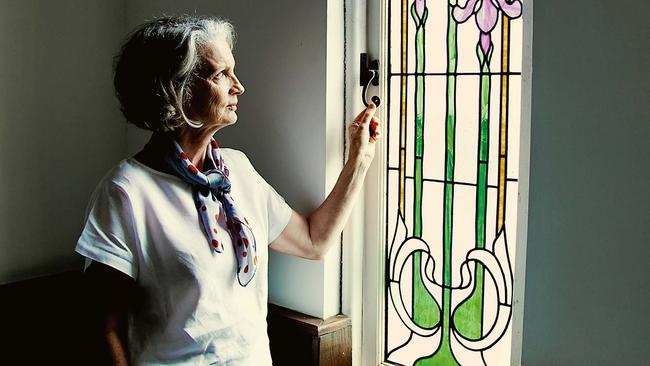
Here’s a beautiful dream. One that came true. In 1985, Tracey and John marry and buy a house on Rode Road, Wavell Heights, for $57,000. Fixed interest rate of 12 per cent. Tracey walks into her new kitchen and is so moved by what she sees out the window that she phones Helen. “Mum, you won’t believe it,” she says. “I can see The Castle from my kitchen!” Their new home is one street from Sunny Avenue.
Tracey and John welcome three boys into the world. Alex, Elliot and Fraser. Reasons for being. Reasons for dreaming.
When Alex is still a baby, Tracey receives a phone call from an old friend, Jenny, who says she’s staying in Wavell Heights at her mother-in-law’s house. “Give me your address and I’ll pop over,” Tracey says. This is the day Tracey meets Iris, Jenny’s mother-in-law. The day she steps inside The Castle. “It was built by my father,” Iris explains to her. She raised three sons in this house. Wavell State High School kids.
Over the years Tracey forms a bond with Iris. They go walking, sometimes twice a week. They play bridge together. They talk about theatre and art and raising children and the small wonders that can be found in a suburban street. The birds. The small kindnesses of garbage men. The way kids laugh when they play in the street.
Tracey’s boys are growing; the family needs a bigger house. Tracey tells Iris they’re moving out of Wavell Heights. But Iris is moving, too. She doesn’t tell Tracey she’s experiencing the early stages of motor neurone disease. She is moving into a unit and selling her home for $249,000, and she would love nothing more than to sell it to the woman who as a girl begged her father to drive past this house every week.
Almost a decade later, Tracey is informed of Iris’s death. The news hits her hard. She needs to find some way to pay tribute to her dear old friend. So she builds a window in The Castle to remember Iris’s light. The way that woman shone. Tracey walks now to this window, situated in the stairwell. Sunshine from Sunny Avenue flooding through a leadlight window carved and painted with three perfect purple irises in full bloom.
No. Everything is not all right. Tracey’s boys went and grew up. They grew from barefoot tearaways into good men and they found themselves good women and they found themselves cars and they drove away from Sunny Avenue and found themselves the world. Alex is a chef in Melbourne. Elliot is a pharmacist who plays club cricket in England. Fraser’s an accountant like his dad.
No. Everything is not all right. Both her parents have been diagnosed with cancer. John’s parents have already gone and she misses them every day. They soon saw past the fact Tracey went to Hendra High, past their shallow assessments of what makes a good person. They loved her dearly and she loved them back. She had a special bond with Jack, whose funeral was at a nearby church. Her boys were too young to go to the burial so she had to bring them home after the service. But John’s sisters knew how much Tracey cared for their father and they organised for the hearse to drive past on the way to the cemetery. Tracey stood on the front patio and said her silent goodbye to Jack as the hearse slowly drove past The Castle. That small Sunny Avenue moment is so very precious to her now. She doesn’t want to ever lose all these memories. These stories.
“Everything all right?” asks the garage door man. Yes. Everything is exactly as it should be. She’s grateful for it all. She gets to live on this street. She gets to live in this house. And she’s a proud and dedicated volunteer salad maker: every Monday she drives to the FareShare kitchen in Morningside where she makes healthy salads with other volunteers inside the biggest charity kitchen in the Southern Hemisphere. Tracey’s group cooks more than a million meals each year for Queensland’s homeless and at-risk. She’s been working extra shifts lately to make meals for firefighters.
Yes. Everything is all right. There’s a new generation of kids growing up in Sunny Avenue. They play with tablets more than cricket bats but they laugh just as loud as her boys ever did.
Tracey stares at her battered garage door. “It’s just a garage door,” she says.
Three weeks later, the old door is gone. The replacement is exactly the same, a plain black roller door. It’s new and functional and boring. No more dents. No more stories.
Tracey sends a group text off to her sons informing them that the old garage door is gone. The boys are mortified. They want their mum to send them photos of the old door. They want close-up shots of the dents in the door. Every dent has a story. Elliot texts from England that he’s just been named player of the year in his club cricket team. “Everything I know about cricket, I learned in front of that garage door,” he says.
Tracey tells her sons that a journalist has been walking up and down their old street looking for stories about Sunny Avenue. Elliot sends a late-night message. “Mum, I think an important story is the love we had of spending time with every kid in the street,” he writes. “The walk to the Bulows two houses down. The walk to Shaw Park and the swing that leads to the water. I had childhood friends next door. Cricket club down the road. My best friend was two streets away and my future fiancee lived three streets away. In the space of two kilometres I had my whole universe.”
The following morning Tracey wakes to another message from Elliot: “When I think of Sunny Avenue I think of you and Dad providing the perfect childhood for me.” Tracey is already crying by the last two words: “Thank you.”
Such a simple text, but a beautiful thing for a son to send. Sometimes a mum needs to be reminded that she’s always been good enough.
Next week: The story of Hantun
